Pew Research Center
Ten years ago, the U.S. Congress launched a debate on U.S. international religious freedom policy that ultimately resulted in the International Religious Freedom Act of 1998. Foreign policy actors continue to debate how religious freedom – and religion itself – should be factored into U.S. foreign policy.
Has the State Department interpreted the international religious freedom policy too narrowly over the past decade by focusing on individual cases of religious persecution? Does the country need new legislation to mandate a high-level understanding of religion among State Department officials? Does a robust international religious freedom policy truly advance U.S. national interests? The Pew Forum on Religion & Public Life invited three distinguished speakers to address these and other fundamental questions.
Speakers:
John V. Hanford III, Ambassador-at-Large, Office of International Religious Freedom, Department of State
John Shattuck CEO, John F. Kennedy Library Foundation
Thomas F. Farr, Former Director, Office of International Religious Freedom, Department of State
Moderator:
Luis Lugo, Director, Pew Forum on Religion & Public Life
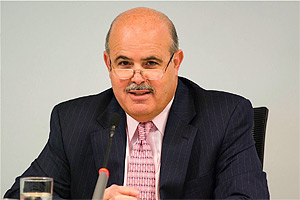
LUIS LUGO: Good afternoon, ladies and gentlemen. Thank you all for joining us today. I am Luis Lugo, the director of the Pew Forum on Religion & Public Life, which is a project of the Pew Research Center. The Center is a research organization and does not take positions on policy debates, including the present one. I am pleased to welcome you to a discussion of international religious freedom and U.S. foreign policy.
Ten years ago this spring, the U.S. Congress began a lengthy debate on this topic, which culminated in the passage in 1998 of the International Religious Freedom Act. This legislation sets forth a mandate for the United States government to tackle the problem of religious persecution worldwide. This is no small task. According to the State Department’s annual report on international religious freedom, more than half of the countries in the world have documented cases of people being physically abused or displaced in their homes at least in part because of their religion. The U.S. currently has seven countries on a list of especially egregious violators of religious freedom, otherwise known as countries of particular concern. That number may be small, but it includes such countries as China, for instance, on some of whose exports the U.S. has placed sanctions because of ongoing persecution of Christians and Muslims in that country.
Almost 10 years after the passage of the International Religious Freedom Act, we thought it would be worthwhile to step back and take stock of this effort. There are, of course, the large questions. Does an assertive policy on international religious freedom truly advance the U.S. national interests around the world? If not the national interest more broadly, does singling out religious freedom as a special foreign policy priority serve the interests of promoting human rights around the world?
Then there are the important questions of implementation. Have the president and the State Department properly interpreted and implemented the International Religious Freedom Act over the past decade? Could and should the policy be implemented any differently?
To help us explore these and related questions, we are delighted to have with us three very distinguished experts. I’ll keep my introduction very brief.
John Hanford is ambassador-at-large for the Office of International Religious Freedom at the State Department. As a former Congressional fellow on the staff of Senator Richard Lugar, he was instrumental in crafting the International Religious Freedom Act 10 years ago.
John Shattuck is CEO of the John F. Kennedy Library Foundation. As the assistant secretary of state for democracy, human rights and labor under President Clinton, he helped raise the profile of human rights and U.S. foreign policy after the end of the Cold War. He is the author of Freedom on Fire: Human Rights Wars and America’s Response, which was published by Harvard University Press in 2003.
Tom Farr was the State Department’s first director of the Office of International Religious Freedom, where he served until 2003. He is the author of a forthcoming book from Oxford University Press on religious liberty and the American national interest. Faith and Freedom, Tom, is that the title?
THOMAS FARR: That’s close enough. (Laughter.)
LUGO: And when will it be out?
FARR: Hopefully during the presidential campaign.
LUGO: Very good. We are delighted to have all of you with us today. This is meant to be a conversation. We were going to have a roundtable format, but even with our limited list of invitees, the response was so overwhelming had to go to theater style.
Ambassador Hanford.
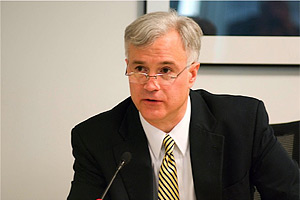
AMBASSADOR JOHN V. HANFORD III: Thank you, Luis. Let me thank the Pew Forum for valuing this issue, as you have for a long time, and for putting on this event, which commemorates the 10th anniversary. It is an honor to appear on this panel with such distinguished colleagues. I worked with John Shattuck and his shop when I worked with Senator Lugar and appreciated very much their work across the whole human rights spectrum. Of course Tom Farr was the first office director of the Office [of International Religious Freedom,] which is when the lifting was the heaviest; a lot of what we have today is built upon the foundations which Tom laid for us.
I’m also honored to see a number of people here today whom I respect a great deal, people who have worked hard in this field for years, some within the State Department, some without. We have a number of people from the Commission on International Religious Freedom, including Mike Cromartie, who is a vice chair of commission. People like Mike Gerson, who has cheered me on in these efforts since we were both lowly staffers on the Hill. And Doug Johnston who’s really led the way in the thinking on this issue for many years. I’m also honored to have many from my staff here.
When called upon to speak, it’s always good to make a presentation filled with suspense, saturated with controversy, and maybe having a romantic element on the side. (Laughter.) However, when it comes to today’s topic and my presentation, I’m afraid there’s not much suspense surrounding my position.
My position is that in 1998 Congress in its great wisdom passed a very well-conceived piece of legislation and that, secondly, the Office of International Religious Freedom at the State Department has done a faithful and dare I say commendable job of carrying out this mandate. For those of you who were sitting on the edge of your seat, that’s where I come out on this.
However, there is still plenty of room for controversy, and I have the sneaking suspicion we may have a bit of that today. I’m reminded of the adage some of you may have been taught by your parents, as was I, that whenever you find yourself in polite company, or on a first date, you should avoid three topics: sex, religion and politics. In our brief time, I’m not going to be able to talk about the first of those three. We’ll save that for another Pew Forum [event] that Luis can moderate. (Laughter.) But I don’t think we’ll be lacking when we have religion and politics mixed.
In the few minutes I have today, I’d like give a brief history of the International Religious Freedom Act, or IRFA; a quick summary of the permanent apparatus in our government the act has created; and then a very brief review of some of the successes. Hopefully this will set us up for a vigorous discussion.
In 1997, the opportunity presented itself to work on legislation. Frankly, the feeling on Capitol Hill was this issue had been neglected. First, a real champion on the issue of international religious freedom, Frank Wolf, came forward with a piece of legislation for the Wolf-Specter bill. This had not been written in his office, but it paved the way for consideration of legislation and was successful in the House. I sat down with Wolf two or three times and mentioned a couple of things I felt would be detrimental to religious freedom in the legislation. He graciously removed those things. He agreed with me, but then his attitude was, “I’m concerned about the momentum. I don’t want to make any more changes.” He said, “John, if you can write a better bill, then I’d encourage you to do that.” In fact, he told me that three times.
So I pulled together two other people to work with me on this. One was a particularly impressive brunette, and don’t let anyone tell you that legislating can’t be romantic, because Laura [Bryant Hanford] is now my wife, and she’s at a special event with one of our children at school today, but I think she’ll be arriving in a few minutes. That’s the element of romance I was talking about earlier (chuckles.) There was also an impressive balding redhead, Will Inboden who was hoping to be here as well. He’s now the senior director for strategic planning at the National Security Council.
The three of us spent months sitting around a conference table poring over the question, how do we devise the best possible law and policy for the U.S. government to focus on this issue? We carefully studied other human rights laws, sanctions regimes, trade law, the Foreign Assistance Act, the Arms Export Control Act, the International Financial Institutions Act. We consulted experts, and we spent months brainstorming. Mostly, though, we drew on our own experience.
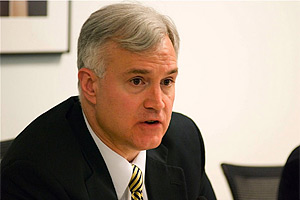
By that time I had been working for 11 years full-time on religious freedom issues. The other two, Laura and Will, had also worked for several years on these issues – both in Republican and Democratic offices and under Republican and Democratic administrations. We had approached persecution problems from many different angles and tried a lot of approaches. We had learned from Senator Lugar, in my case, or Senator Nunn or others we had worked for. We had seen how prisoners could be released or how an execution of a religious believer could be prevented, or how a major law could be stopped in a foreign country. We had seen what worked through U.S. diplomatic channels, and we had worked with getting presidents, secretaries of state, and, of course, the Hill motivated. Our goal was to develop an approach that would insure vigilant attention and use the vast array of tools in the U.S. foreign policy toolbox to bring lasting change.
If you read the bill, you’ll see it’s quite comprehensive. It touches on a lot of things I’m not going to have time to go into today. Our goal wasn’t just to punish, but to promote the advance of religious freedom, all within the context of responsible U.S. foreign policy. We were honored to have Senator Nickles be our chief sponsor. In fact, I ran into him at a party this weekend; he was playing with his grandchildren and I with my children (chuckles). His staffer, Steve Moffitt, joined the three of us and set apart the best part of a year of his life to plug away in writing and negotiating this. Then Senator Lieberman became our chief Democratic sponsor and was terrific to work with.
We negotiated for many months – tough negotiations. I led in those along with Steve Moffitt, but what emerged was largely what we began with. Very little got changed in the process of negotiating with the State Department and the White House. I was pleased the Clinton administration came out in favor of the act – one day before its passage, but better late than never. The bill passed 98 to 0 in the Senate, and then passed by voice vote in the House of Representatives and is considered one of the most significant pieces of human rights legislation.
Bob Seiple was the first ambassador-at-large, and he did a fabulous job laying the groundwork. I was honored to be chosen by President Bush, but now I have to implement what I worked to create, and it’s a lot of work.
Let me share a few of the bill’s provisions, which most of you know, but which some of you may not. The legislation sets up a position for an ambassador-at-large, which is a high-level diplomat to work these issues face-to-face with foreign officials, and a permanent office at the State Department. Our job is to identify, get to the bottom of and solve problems of religious freedom around the world. It sets up a commission, the U.S. Commission on International Religious Freedom, with nine commissioners who are chosen in a bi-partisan way; some are Democrats and some are Republicans. We do an annual report – [for 2006, it was] 800 pages, covering 198 countries. This year’s going to be 199, isn’t it?
UNIDENTIFIED: One-hundred-ninety-eight.
HANFORD: A-hundred-ninety-eight again. If anyone can find two more countries, let us know. I want to get to 200 before I leave.
We also have an annual process to identify the worst violators, and these are called CPCs, countries of particular concern. The countries on this list now are North Korea, China, Burma, Sudan and Iran. Two years ago we added Vietnam, Saudi Arabia and Eritrea, and several months ago we removed Vietnam and added Uzbekistan. I should add, it’s very unusual in law to have a required process of naming and identifying [particular countries.] There are vague laws where we’re required to do this by Congress, but not come forward and say what they are. The IRF Act took things to another level.
Action is required under the act against countries that violate religious freedom, even against countries that violate it in a fairly mild way. Every year, we’re supposed to be taking action, and in fact the international religious freedom report requires our embassies around the world to report, to be accountable for what they’ve done in the previous year, and not only identify the problems, but say what they’ve done to promote religious freedom or to solve the problems.
There are a number of optional actions that can be taken, and these are calibrated from mild to severe. In the case of CPC countries, there’s a narrower list, with more severe options, and these can include sanctions, or a more flexible approach like signing an agreement that gives a country a way out if it’s willing to fulfill the agreement. We thought up as many innovative things as we could to advance religious freedom.
The IRF Act takes a comprehensive approach, covering issues such as training assistance; program funding; asylum, refugee and visa policy; and international exchanges and broadcasting. I would say the IRF Act does one thing and does it well. It doesn’t seek to address all religious issues, but just the core one, and that is the freedom of people to follow the dictates of their own hearts in seeking and serving God.
Let me address the International Religious Freedom Act, one decade later. When this legislation was passed, I didn’t expect 10 years later we would have the successes we can point to today. We still have to fight bureaucratic battles within the State Department, but increasingly the department has seen the value our office brings to the table and the changes we’ve been able to make.
When Ambassador Seiple started, he had a vacuum cleaner and a contract secretary in his office. After 20 years of working on this, we now have a 20-person office, and I like to brag we have almost more Ph.D.s per capita than any other office, more lawyers than any office but the legal office, and probably more seminary grads. I like to say we can out-think, out-sue and out-pray any other office at the State Department. But we’re still a tiny office taking on the whole world’s religious freedom problems.
In terms of laws changed, people released from prison, and even tolerance increased, we’ve had about as strong an impact around the world as any office at the State Department on a per capita basis. When we began this, religious freedom was in some ways the forgotten human right. Now we are engaging vigorously in countries around the world and increasingly in multilateral fora, such as the U.N. and the OSCE. The IRF report has become the gold standard of religious freedom reporting. It’s an enormous encouragement to people around the world who read about their plight and find it posted in their countries, in their language, on the U.S. Embassy websites. I have foreign ministers and others tell me how they read it and learn a lot about religion in their own country as a result. It’s impossible to estimate the impact of this.
The CPC process has also been quite successful. Far from being a knee-jerk list of the countries we love to hate, it’s a carefully considered [list] made each year by the Secretary of State. We’ve tried to be as creative and productive as we can in implementing the requirements of action. For example, in the case of Vietnam, as many of you know, we negotiated an agreement under which Vietnam could come off [the list.] The change has been dramatic. When I began working with Vietnam, about 1,200 churches and places of worship had been recently shut down. They were basically trying to wipe out Protestant Christianity in two regions of the country. They had arrested dozens of religious leaders. They had a horrible practice of forced renunciations of faith, which they were carrying out all over the country, with tens of thousands being forced to renounce their Christian faith. There were people being beaten to death and others being physically abused.
As of November, 2006, we’ve seen legislation pass [in Vietnam] banning forced renunciations of faith. It has essentially ceased. We’ve seen all the prisoners we were raising on our list released. We’ve seen virtually all of the closed churches reopened. And we’ve seen the government going a step further and recognizing whole new groups of religions. I heard about one on my way over here today. Underground groups of various denominations and religions are now being registered and made legal; people are no longer having to meet in the same fear.
In the case of Saudi Arabia, we went after the issue of extremist hate literature, in which the government had been responsible for the propagation around the world of textbooks and other materials that called Jews pigs and Christians dogs and were filled with other hateful references. The Saudi government has now committed to us that they will cease, and have ceased, sending these materials anywhere in the world, and that they’re going to revise these materials and textbooks, [starting] from about a year from now. We’re following up with them on that. They’ve also curbed the mutaween, the religious police, who were responsible for raiding private places of worship, and there have been very few instances of that now. I would say probably a million people of minority faiths are able to meet without harassment in a given week [in Saudi Arabia.] And we’ve negotiated a number of other things with them as well.
In conclusion, too much, too little or just right? I believe we’ve come close in the IRF Act of getting things just right.
LUGO: Thank you very much. (Applause.) You set a good example in keeping to your time restraints. (Laughter.) John Shattuck.

JOHN SHATTUCK: Thank you very much. I’m delighted to be here and of course have admired the work John has done over the years. I was probably invited today because I was there at the creation and early days of this office, and indeed the early days of religion in a formal sense in American foreign policy. But I’m a bit of a runaway father in that I was there at the birth, but then disappeared very quickly, about three weeks after the enactment of what you call [the] IRF Act. I want to say I was not involved in the name – (laughter) – it’s a rather complicated name to project, but I became the U.S. Ambassador to the Czech Republic, so I was not there for those early challenging implementation days.
Let me pose four basic questions, which we all are thinking about, and then answer them in terms of my own perspective. First of all, and probably most importantly, what do we mean by religious freedom? What, exactly, is this concept we are promoting? Second, why is the promotion of religious freedom internationally important to our national security and therefore our foreign policy? Third, how well does the International Religious Freedom Act actually protect our national security and do the job it set out to do when it was enacted? Fourth, how should we approach religious freedom in our foreign policy today, and what, if any, changes should be made both internally in the State Department and more broadly in the U.S. government generally speaking, and perhaps even in the International Religious Freedom Act?
What do we mean by religious freedom? I’ve written an article about this in the Harvard Human Rights Law Review. Let me summarize it, because it’s important we go right to the very beginning to understand what we’re wrestling with.
In the beginning, quite literally, as the Bible says, there was God and religion. But by definition, there was not religious freedom, because having religious freedom, at least in our perspective today, means, perhaps, to have more than one god, or more than one religion, or maybe even no god or no religion at all. Freedom and religion are [in] a complicated juxtaposition. As we look back through history, we find when a religion came into contact with another religion, it almost invariably led to conflict and war. If you take just Europe in the last millennium, you come up with the Crusades, the Islamic conquest, the Inquisition, the Thirty Years’ War and the Holocaust.
Out of the terrible horrors of the Second World War came an idea, a rather remarkable idea. It’s the idea that best defines religious freedom today, and it comes from the Universal Declaration of Human Rights. It’s intended to deal with this horrific history of religious conflict that has so shaped human civilization over the centuries. The idea is freedom of religion is tolerance of religious difference. It recognizes there is more than one religion in the world, and it’s important to figure out ways, internationally and domestically, of promoting tolerance of those.
There’s a basic strategic reason for this, which all of us can recognize, that tolerance is essential to protect one’s own religion and one’s own deeply held religious beliefs from external manipulation or efforts to overcome them, perhaps from other religions that are pushing in the opposite direction. That is the basic reason for religious tolerance.
The modern concept of religious freedom is essentially that tolerance of your own religion by others is a human right and is also a very important recognition of the religious pluralism of the world.
Second question: why is this concept of religious freedom so important to our national security today? We live in a time of unprecedented religious pluralism in the world, and in our own country many, many different religions co-exist. We’re also in a time of unprecedented contact among religions as a result of the communications revolution and all the ways in which the world is shrinking.
At the same time, and I recognize this in my own life, there is a greater interest in religious belief and the rise in religious belief. If you look around the world, religious belief is thriving in all its pluralistic variety, with the possible exception of Europe and the country I served in, the Czech Republic, where there is probably the least interest in religion, partly because of the 30 Years War, in which Protestants and Catholics spent so much time in conflict with each other, wiping each other out. But that’s a side point.
We have a rise in religious freedom and an interest in things other than the secular world, which so defined the 19th century and 20th centuries.
In this setting, religion is increasingly a motivating factor in political, economic and cultural affairs and in international relations and the ways in which countries relate to each other. It’s profoundly in our national interest, and our security interest, to come to grips with religion as a motivational force in international relations and to promote religious tolerance as a way of deterring conflict and protecting our own freedom from external and internal threats.
We have done this quite well domestically for some time. The United States has a good record of religious freedom protection, in terms of the tolerance we teach in our schools, and in our anti-discrimination laws, which protect religious exercise. But until recently, we haven’t done this internationally. Here we come to the International Religious Freedom Act, and what John has been discussing.
How does the International Religious Freedom Act protect our national security by promoting religious tolerance as I’ve described it? The short answer is, frankly, not very well. This is partly because it is misunderstood in many places abroad, where it is implemented, and partly because as it has been implemented, despite the very good efforts John and his office have made, it is not yet in the mainstream of American foreign policy, where I think it belongs.
There are four ways in which it’s misunderstood abroad. They’re wrong, and they’re rebuttable, and I’ve rebutted them in conversation with people overseas, but they’re there. We need to recognize them. First is the perception that this legislation predominantly represents the interests of missionary religions, interested in proselytizing and changing people’s religious views in other countries. This is certainly not [found] anywhere in the legislation. It’s not technically or literally true, but it is true certain evangelical groups lobbied heavily for the International Religious Freedom Act and that record, unfortunately, has carried into the way it’s perceived abroad.
The second perception is the U.S. cares more about religious freedom as we define it than about other international human rights, and that that the U.S. is projecting its interest in its own concept of freedom of religion to other countries, trying to export a uniquely American brand of religion. Here again, there’s nothing in the legislation that would suggest that, but there is a fairly widely held perception that that’s the case. The third perception is – and it’s completely rebuttable because I worked on this aspect of the law – that the International Religious Freedom Act is based on a punitive model, in which mandatory sanctions are imposed on countries seen by the U.S. to be persecuting or denying religious freedom.
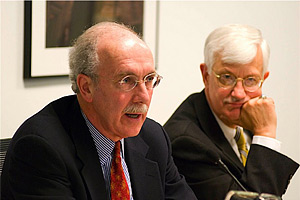
The sanction system is, in fact, discretionary, and there’s much more emphasis put on diplomacy – that’s certainly the effort made in the office Ambassador Hanford heads. Nonetheless, that is a perception.
Finally, there’s the perception the International Religious Freedom Act is another example of U.S. unilateralism at a time when there are altogether too many examples of that. Since we have yet to ratify a number of international human rights treaties, and in some respects are seen to be at odds with or even in violation of some international treaties that we have ratified, this perception is hard to dispel.
Let me conclude by coming to the fourth and final point, and here’s where the good news comes. The question is what we should do to promote religious freedom in our foreign policy going forward, which I agree is in our national security interest and which is an important element of the State Department’s activity today.
In many ways we’re stuck in the place the Human Rights Bureau was stuck in its earliest days, in that we are engaged primarily in what I call “naming and shaming” – taking individual cases of persecution and focusing on how people can be released from prison and how countries violating religious freedom in terms of imprisoning individuals can be put in the spotlight. This is fine, but it’s not enough. And it’s not only not enough, but it’s somewhat diversionary from the much larger effort to connect religious freedom with the mainstream of our foreign policy.
We need to develop our understanding and expertise in religion as part of our foreign policy. We have experts on economic or military or other issues in the mainstream of our foreign policy, but we don’t have experts on the broad religious elements motivating so much of international behavior. We’re very good at advocating on behalf of those who were facing persecution, but I question whether we are very good at understanding the difference between Sunnis and Shiites and the other elements at work in the terrible conflicts of the world.
We also need to use our foreign assistance much more effectively in promoting institutions that can protect against discrimination toward religious minorities, or that can otherwise build institutional structures similar to what we do in promoting democracy more broadly. I don’t think we do enough of that; we should do much more of it.
Finally, but perhaps most cogently in terms of Ambassador Hanford’s job and position, I think the position of ambassador for international religious freedom is buried in the State Department bureaucracy, and it ought to be enhanced significantly, perhaps turned into another bureau – although I’m not sure I would favor that. Instead I would favor mandating that all functional and geographic bureaus be charged with responsibility for developing religious freedom expertise, particularly on the religions in the areas they are engaged with, and promoting religious freedom as religious tolerance and developing the institutions that I’m talking about. Only that way are we going to find this issue put into the mainstream of American foreign policy, where I think it belongs.
So let me stop there. I hope you found much to disagree with and agree with. Thanks.
LUGO: Let me see here, Ambassador Shattuck, misunderstood abroad, not mainstream at home and diversionary from the main agenda, but other than that, Mrs. Lincoln, how was the play? (Chuckles.)
Okay, it’s Tom Farr’s turn.

TOM FARR: Thank you, Luis. Thanks to you and all of the good people at the Pew Forum for putting on this panel. It’s an honor to appear with Ambassadors Hanford and Shattuck.
You can count me among the people who are enthusiastic supporters of the policy begun in 1998 with the International Religious Freedom Act, but also among those who believe there is an untapped potential – I would argue a vast untapped potential – in the law. That is what I would like to talk about today.
With the exception of some of the initiatives Ambassador Hanford has taken in recent years, some of which he has talked about, our policy for the last nine years has not been one of promoting religious freedom at all; it’s been one of opposing religious persecution. The two things overlap but they are not the same thing overall.
It’s time for us to think – and I’m going to agree more with Ambassador Shattuck than I expected I would – more normatively about religion in order to begin to promote regimes of religious freedom as part of our foreign policy.
If we do this, we can address a number of international issues important to our national security and our fundamental interests, including doing a better job of reducing religious persecution around the world and addressing what many scholars and policymakers are beginning to acknowledge, as Ambassador Shattuck just did, and that is, to put it mildly, our tone deafness about religion in American diplomacy. Or to put a little stronger: our incapacity to deal with a world of religion, as Philip Jenkins put it, a world in the 21st century in which religion is replacing ideology as the prime motivating factor in human behavior.
I would also add, given some of the misperceptions John Shattuck pointed out, that a more capacious understanding of promoting religious freedom would begin to address some of those misperceptions – and I agree they are misperceptions – particularly the one that the international religious freedom act was designed to make the world safe for American missionaries abroad.
Let me run through some of my logic here, obviously painting with broad strokes. For the most part, if you look at what we have done for the last nine years, it has followed a pattern: We identify the persecutors and the persecuting behavior with the excellent international religious freedom report, supplemented by the reports from the commission. We denounce the persecutors and their behavior, as required by the law. We try to rescue the victims as best we can. We try in many ways to help them get out of harm’s way.
Then we threaten [offending governments] with any number of possible actions from a démarche on one end, which, having delivered them, can be a very scary experience for both sides, all the way to serious economic sanctions, which I believe we have done in one case, that of Eritrea.
It’s fair to ask, after almost a decade of doing this, what has it wrought? What impact have we had on international religious persecution? I would answer in two ways. First of all, it’s very important [to note] there are hundreds of people, maybe even thousands of people, walking the earth free today because of our religious freedom policy, because of this law and people like John Hanford and the people in the Office of Religious Freedom, and American diplomats around the world.
But if you ask the macro question, has religious persecution diminished internationally the last decade, the honest answer has got to be, no, it hasn’t; indeed, an argument could be made it has increased. In those cases where we have had a real impact, it’s been because of military intervention, [not] religious freedom policy.
In Serbia-Kosovo, in Afghanistan, and in Iraq, after we overturned those totalitarian or despotic regimes, religious persecution went down precipitously, as did other forms of human rights abuse, but then after a few years, in all three cases, they began to come back. I would argue we do not have today in any of those three cases regimes of religious liberty, nor have we attempted through our religious freedom policy to encourage them.
What do I mean by [encouraging] regimes of religious liberty? Leapfrogging over the strategies and tactics required, how should we think about this conceptually? One way to do it is provided by a Columbia University scholar named Al Stepan, who has written about the “twin tolerations.”
Some of you may be familiar with this. The twin tolerations are, in a democratic regime, a political-religious settlement between powerful religious communities and civil authority in which religious individuals and communities are given large freedoms, certainly freedom from persecution, but also the freedom to be religious, to build churches or synagogues, to have clergy, raise children in the faith, but also to bring religious truth claims into society, to convince others of the truth of those claims peacefully and without deception, and – here is where we get into some heavy weather, if we are not in it already – to participate in the political process, to bring to bear their religiously informed moral judgments into the public square on the same basis as other members and institutions of civil society. In return for this, religious individuals and communities must forswear any access to civil authority, to privilege membership in their organizations, or to coerce the conscience of anyone. These are the twin tolerations.
Now, Stepan in his study, in the Journal of Democracy, noted that historically, transitions to democracy successful among societies with powerful religious communities do not occur by what he called the “Rawlsian normative roadmap,” namely the privatization of religion, or the strict separation of religion and state, but by a theological buy-in by the powerful religious community so they are embracing democratic norms not in spite of their religious teachings but because of them.
This is how we should begin to think about religious liberty and promoting stable self government around the world, especially in the Muslim world. Needless to say, we don’t do that right now. We are not promoting religious liberty that way, nor are we thinking normatively about religion, as John Shattuck very correctly said.
This is not a new theme. Doug Johnston, who is here, began sounding this theme in his book, Religion: The Missing Dimension of Statecraft, back in the mid-90s. Former secretary of state Madeleine Albright last year, in her book, wrote about the tendency of American diplomats to think of religion as nothing but trouble and to stay away from it as an irrational aspect of human behavior. Most of us don’t have any problem thinking of [religion as important in foreign policy;] it’s the incorporating of it into solutions to the problems we have today that we’re falling short on.
The Center for Strategic and International Studies has just completed, or is in the process of completing, a year-long study on religion in American foreign policy. Though it’s going to note progress in some of these areas, particularly within our military, interestingly enough, and our intelligence, they are also going to note huge gaps in our American diplomatic effort around the world.
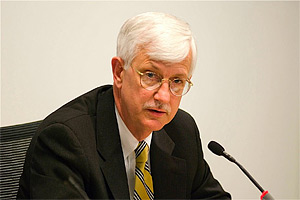
If you think about it – I don’t want to get too far into this, but maybe we can talk about it – the intellectual climate for this is fundamentally secularistic. If you look at classical realism, liberal internationalism – including liberal hawks such as Peter Beinart, drawing on Reinhold Neibuhr – and, interestingly, the neo-conservatives who have run our policy, as far as I know, since 9/11, none of them think normatively about religion in the way American diplomacy should engage the world.
What do we do about this, if it is true? There is a lot to be said here. As far as the International Religious Freedom Act is concerned, of course, Congress could, if it chose, amend the act, but I don’t think anything I’m talking about is prohibited by the act, and indeed, many of the themes I am hitting are, as John Hanford said, hit in the act itself. Few of them are mandatory, and they haven’t had the influence I would like to see in normalizing thinking about religion in foreign policy.
For example, we do not have the training at the Foreign Service Institute we need. It is ad-hoc at best. We need to move from the current situation, in which we have some excellent people in the Foreign Service who happen to be interested in religion because they are Mormons or Muslims or Holy Rollers or whatever they are. That is not how we ought to be engaging the world of public religion in the 21st century. We should incorporate it into our training. We should, in my view, have a sub-specialty under political and economic training for Foreign Service officers that engages religion.
I believe – and here again I’m finding myself agreeing with John Shattuck – that the Office of Religious Freedom should be removed from its quarantine under the Human Rights Bureau in the Department of State, which is what I think the International Religious Freedom Act intended all along.
Let me end by hitting one quick policy area where the rubber really meets the road, and that is the issue of political Islam, that is, Islamism and Islamist extremism.
You can divide American foreign policy thinking on this into pre- and post-9/11 [categories.] Before 9/11, American diplomacy assumed a direct line between political Islam and Islamist terrorism. We were traumatized by the 1979 Shiite revolution in Iran – our incapacity to understand what was going on there, much less what has happened since – and the terrorism with which we have been afflicted with since then. Then came 9/11, and this reshuffled the cards of our thinking about political Islam. But I would suggest the democracy promotion effort that ensued after 9/11 was essentially a secularistic effort.
We took the money we had been spending with the NED [National Endowment for Democracy (http://www.ned.org/)] for 20 years, [and] we moved it into the Middle East. We taught people how to engage in constitution building and political parties and civil society building, but we did not engage, and we still do not engage, the main drivers of political society in the Muslim world, and that is Islamist communities.
The best example for this, in my view, is the Muslim Brotherhood. It’s not the only example, but in Egypt we’ve talked to the Muslim Brotherhood ad hoc for 20 years or more. We’ve had no policy to do so. It’s time for that, in my view, to change. We need to develop guidelines to discern which members of the Muslim Brotherhood are capable of being enticed to democratic norms, and we need to engage them publicly with our public diplomacy, our private diplomacy, and our democracy-promotion funding.
I’ve spoken a mouthful here. I don’t mean to imply the Office of International Religious Freedom should take all of this on itself. It began with Bob Seiple and a vacuum cleaner and is now Ambassador John Hanford and over 20 excellent staff, some of the best people you’ll find anywhere. They are the only bureaucracy we have in the Foreign Service that engages religion. I believe it should be institutionalized in many of the ways John Shattuck has suggested.
We need to have the NEA [Bureau of Near Eastern Affairs] thinking about religion. We need to have EAP [Bureau of East Asian and Pacific Affairs] and the European Bureau and the South Asian Bureau not thinking of this as the compartmentalized issue they do now, but as something that is part of what we need today to engage a world of public religion. It’s an important opportunity. I think we have many ways to engage it, and I hope we can talk about this in the next few minutes. Thank you very much.
LUGO: Thank you, Tom – very thoughtful, all three comments. (Applause.)
There is a lot that’s been put on your plate, but I wonder if you could start, Ambassador Hanford, to address the large question, which is part of both critiques, that however well intentioned – and they clearly agree with the objectives of the policy – the establishment of the office perhaps had the unintended consequence of ghettoizing or compartmentalizing this interest in religion in our foreign policy establishment, thus preventing it from becoming more mainstream, and as a consequence, more effective in advancing religious liberty. I gather that’s the main thrust of their macro-critique of the office.
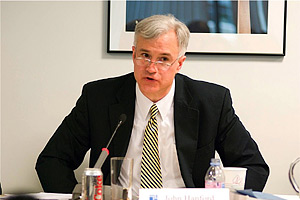
HANFORD: I certainly won’t argue the issue has had its challenges in being mainstreamed over time. That’s true of any issue, but there’s something about religion and the way many people react to it. In our country, concerns, which I often view as excessive, about separation of church and state can feed into a lack of comfort about religion. An awful lot of progress has been made in mainstreaming the religious freedom issue in the State Department, and the way you do that, unfortunately, is not by making one eloquent speech in front of everyone at the State Department, but by earning the trust day after day after day as you work with all the different people and bureaus over time, and they realize you are helping to advance the goals of the U.S. government in advancing democracy, fighting terrorism, and promoting stability and security around the world and for our nation. We’ve made a great deal of progress in doing that through our work.
Let me just respond quickly to some of Ambassador Shattuck’s concerns. I’ve heard the critique before that the IRF Act was set up to advance missionary work. I don’t know where in the world this comes from, because there is no truth to it, and there is no evidence that has been the case in the way it has been implemented. It is true there has been some association of this act with missionary-type groups in the press. I feel that a lot of this has been intentional and intended to undermine the credibility of the act. I must say I was disappointed, as we were fighting in the trenches to get this bill enacted, that those who had supported the House bill, the Wolf-Specter bill, which included many evangelical groups, were very slow to get behind the International Religious Freedom Act.
The group supporting it most strongly was the Episcopalians. The Methodist women’s group supported it. The American Jewish Committee supported it. I believe the Baha’is did too. It was a very diverse group that got behind the International Religious Freedom Act. In fact, the reason the Episcopalians were so good – and they put more time into it than all the other groups combined – was because the two staffers in that little office had worked on the Hill or had a very sophisticated understanding of what made for good legislation. One of them is now heading up Bono’s office here in Washington. They could recognize responsible, good, ambitious legislation when they saw it, and they threw their weight behind it.
Secondly, on the issue of religious freedom being vaunted above other human rights. The concern was [religious freedom] was being comparatively neglected, and the value of religious freedom to Americans historically, I think, justifies the concern of Congress to say, “We need to correct the fact that this issue has been neglected.” Secretary Rice said not long ago in a speech, “If America does not rally support for people everywhere who desire to worship in peace and freedom, then I ask you, who will?” I think that expresses it well.
This is a good, natural outworking of the principles many Americans live by, and I think if you polled Americans on what human right means the most to you, perhaps the largest number, or close to the largest number, would say, “My freedom to know and worship God and follow Him according to the dictates of my heart.” I think if you polled people in Muslim countries and a lot of other countries, they would say the same thing. That also is one of the keys to convincing other countries that this is not about getting missionaries in.
When I visit Muslim countries, one of the things that gets us the best hearing [is when] I share all the ways we have fought for the freedom of Muslims to practice their faith without fear and persecution. The fact that in China, Uigur Muslim mothers can be thrown in jail simply for teaching their children in the privacy of their home about their faith is something we have invested enormous effort in fighting. This is something Muslim countries have come to respect, as they have our work on other countries. Our recent designation of Uzbekistan as a CPC was primarily because of their mistreatment of Muslims. This is an important part of our message to the world about where we stand on principle on this human right, and it helps us work with those countries to advance religious freedom for minorities within their borders.
On the argument that we follow a punitive model, it’s true that the IRF Act allows for a punitive approach, and we’ve used sanctions on a number of countries, although they’ve been double-hatted on most – all but Eritrea – with previously existing human rights sanctions. The emphasis under my ambassadorship has been in trying to negotiate agreements and change and progress rather than taking a purely punitive approach.
Turning to some of Tom’s very good suggestions, the focus of the International Religious Freedom Act is diplomacy on behalf of religious freedom. If you look at the act, you can see that really is the focus. It is promoting religious freedom, and we do that, but after you’ve had a warm fuzzy discussion with the Communist government, where they’ll point to their constitution and say, “Look, our constitution guarantees religious freedom,” the only way you can really get down to brass tacks is to talk about the violations and how those need to be addressed, and how people need to be released from prison or torture chambers.
Here again I would say the return on investment for our little office in terms of the promotion of freedom and human rights around the world has been significant compared to much of the work of our government.
I’m not sure Tom is saying the whole agenda he’s laying out – which is a very ambitious one – should be imposed on the Religious Freedom Office. I laughed when I heard him talk about how we can promote religious freedom by invading countries. I was asked at a press conference, “Who are you going to invade next, because the countries you take off the CPC list are the ones that the U.S. government goes into.” But we’ve been able to do that in other ways as well.
I agree there is a vast, untapped potential. My concern is that [our] efforts go into advancing religious freedom in a country, not just in understanding religion writ large or a broad sense of tolerance, though we fight hard for that. It’s really extraordinary. I call this, amongst my staff and when I’m arguing with the Commission on International Religious Freedom, the thousand-step problem. There are three steps that have to happen. First you have to have believers on the ground that cry out, “We need help.” Secondly, someone issues a press release and brings this to people’s attention. Thirdly, people jump up and down and say, “Somebody needs to do something about this.”
I would argue our office does step two and three better than anyone in the world. We publicize the problems. We jump up and down all the time, but the State Department is saying, “Somebody needs to do something about this,” and we try to lead in doing that. But those steps are easy. The hard part is the other 997 steps of working with the government day in and day out, argument after argument, to get people out of prison, to get laws changed, to travel there, to build relationships, to win them over.
What I want to defend is my office’s mandate to do that work, because if we’re required to do a lot of other things that are much more amorphous, we will lose the ability to do that, and we’ll be watered down to doing nothing more than issuing this report and occasionally piping up about problems.
We need to stick with our efforts on fighting the core problem, and that is the right of people to simply believe what they want to believe.
LUGO: Thank you, Ambassador – very well put. By the way, you’re not the only one being pulled in that direction. I hear from military chaplains all the time, who also feel they’re being pulled into an analytical role in terms of U.S. foreign policy, for which they do not believe they’re prepared. Obviously there is a demand out there, and they’re looking around for anybody who knows anything about religion to help out.
Now it’s your turn to get in on the conversation.
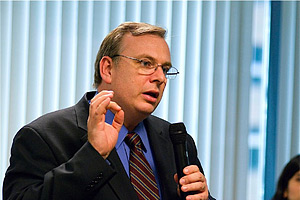
JAMES STANDISH, SEVENTH DAY ADVENTIST CHURCH: I would like to thank the ambassador and the team and the office. What you’ve done on behalf of our congregations around the world has been sincerely appreciated, and you’ve mentioned a couple of the countries you’ve worked on, but there are many others, for example, Turkmenistan, where the situation has changed dramatically because of your work.
I was a little bit concerned, however, with the shyness to talk about missionary work. I’m the son of missionaries. My father was a physician; my mother was a school teacher. They spent most of their career in a Muslim country: Malaysia. Didn’t convert very many people, but did treat a lot of people. I think that (a) in the Universal Declaration, Article 18, one of the fundamental rights expressed there is the right to change your faith. If people aren’t allowed to spread their faith, how can people change their faith? And (b), some of the best ambassadors for this country who will ever be out around the globe are people who are teachers and doctors because of their sincerely held religious beliefs.
LUGO: Thank you.
HANFORD: James, what I’m trying to address is the misunderstanding that all this is about is the U.S. trying to get missionaries into other countries. Our office isn’t focused on that. We do work on the basic freedom of people to change or choose their faith. Some of our work that’s received the greatest headlines, such as the Abdul Rahman case in Afghanistan, had to do with that very issue. There are many more cases we don’t publicize of that sort. But we need to focus on working with these governments on establishing these basic human rights.
I should add to the points I made a moment ago. The most appropriate issue for a government to talk to another government about when it comes to religion is the religious freedom issue. I’m all for talking more broadly about the importance of religion, and I agree fully about the importance of religion to stability and to a democratic society, and I make these points, and I have those discussions, and I’m in an interfaith dialogue with Muslim ambassadors, but, boy, is that slow, amorphous work.
When I sit down with the foreign minister and talk about basic human rights their government had signed onto in U.N. documents, they don’t fault me for that. They occasionally do say, “Why do you Americans care so much about religious freedom?” I have to explain it’s a part of our heritage. But that is the best vantage point for me to argue for these basic rights. That’s where a government belongs at the table. That’s what we should be leveraging: our diplomatic channels, our open doors of dialogue with these governments. That’s where we get the greatest rate of return on our efforts.
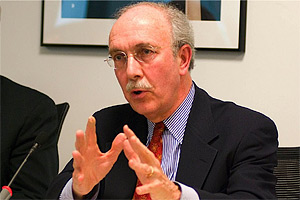
SHATTUCK: Can I just add one point on that? This is obviously a very complicated issue. What is the role of a government and a government agency in defending the rights of people from our own country to go to another country to work with people in that country who may or may not wish to change their faith? My analysis of this, as you can see from the way I started my remarks, focuses on the role of government in promoting religious tolerance in order to reduce the prospect that there will be religious conflict. I myself do not believe it is the responsibility or function of the United States government to promote and assist in the work of those who are engaged in missionary work abroad. I recognize it’s their right to do that, but I would counsel very much against having a U.S. government agency be involved in activity that could be seen to be or indeed was assisting in that kind of promotion.
STANDISH: Maybe what I said was misunderstood. I’m not suggesting the government assist missionaries. What I am saying, though, is that religious freedom includes under its umbrella the right to exchange religious ideas, and it has to be defended. It is core to Article 18.
HANFORD: And we do that very strongly. Of course we argue for the existence of your [Seventh-Day Adventist] denomination, for example, in places like Turkmenistan and Vietnam and other places where it has come to be recognized as legal in the last few years, as we do for a number of other religions. That gives you the freedom to do all those activities. If you get thrown in jail for doing something that is protected by those international agreements, then we’re there to fight to get you out.
Call us if you get thrown in jail, James. (Laughter.)
LUGO: Ambassador Shattuck, you still have reservations, even after he clarified –
SHATTUCK: I do. I do have reservations, and they go to the issue of the way in which we are perceived. I don’t think – and I may be naïve on this – that there are missionaries at work in our country from other countries. I may be wrong. I’m not sure – I probably am wrong –
LUGO: There will be a Nigerian Pentecostal right outside this door waiting to convert you the minute you step out. (Laughter.)
SHATTUCK: Right. Then I will assume they are there, even though they haven’t visited me yet. But I feel very strongly about the way in which, at least in my view, religious freedom is predominantly an issue of religious tolerance. I worry about the connection between our government and those who are indeed engaged in work, entirely legal under the international human rights agenda as you’ve described, that is appearing to be engaged in changing people’s views. That is going to be damaging in the end to our effort to promote what I think is the most important value of religious freedom, which is religious tolerance.
LUGO: Very interesting. Whether it’s a good idea or not, as I said, we don’t take positions, but I do know from looking at the religious demographics that on that question of missionary activity, you are talking primarily about Christianity and Islam. It does not impact as much on other religions that do not have a strong missionary or proselytizing thrust to them. That would be a basic differential.
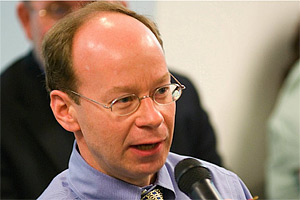
ALAN COOPERMAN, THE WASHINGTON POST : Back in the bad old days of the Soviet Union, the Soviet response to our questions about human rights often went something like this: “We believe in human rights too, but we have a different set of human rights, and our human rights include such things as everybody has the right to a job and everybody has a right to higher education, et cetera. We just don’t exactly accept your set of human rights; we have our own.” It seems to me we sometimes encounter something like that in the realm of religious freedom today. Not that many years ago, I believe, Russia passed a law in which it ensconced the rights of – I think they called them the indigenous faiths of Russia – Christianity, particularly Orthodox Christianity, Judaism and Islam, but specifically seemed to leave out such [faiths] as Mormonism or Scientology or Adventism.
I wondered, since we recognize that even in the United States there are some limits on religious freedom, for example, a church cannot intervene in a political campaign, how you respond to those abroad who say, “We simply have a different understanding of religious freedom, and we, for example, believe that there are certain restrictions we can impose,” as in that Russian law. To what extent is your definition of religious freedom universal rather than particularist?
HANFORD: We do point to the international agreements. We don’t point to the U.S. Constitution. We also make it clear our record is not perfect. I was making that statement just yesterday to an ambassador whose country’s record is far less perfect than ours – (chuckles) – and [I said] that we’re still working things out. I listen politely to the things you’re talking about, and, sure, governments have lots of excuses. But generally speaking, at the end of the day, they see the validity in what we’re asking for, and maybe their way of working out religious freedom will wind up being somewhat different, but it may still represent a great deal of progress. I’m hearing people now who are diminishing our success in Vietnam by saying, “A government shouldn’t require any religion even to register. They should just be free in every sense of the word.”
It’s a great step of progress to have churches that are allowed to exist unharassed, for the most part, and register. I’d much rather have that than have people thrown in jail and raided in the middle of the night and being forced to renounce their faith. Sometimes we have to seek the art of the possible.
I worked on Russia a great deal back when I was with Senator Lugar. We met with the head of religious affairs for Russia – for the Soviet Union, sorry – for the Soviet Union and got them to commit to release their last 200 religious prisoners. Then we fought like crazy to stop the religion law in 1997, and we’re still fighting. I can tell you we’re working on it right now to see that the law is implemented in a way which does not disadvantage minority faiths.
The European court has recently ruled in three cases, including ones involving Scientology and the Salvation Army, that Russia has gone too far in restricting those minority faiths, and this is something we’re working with them on now.
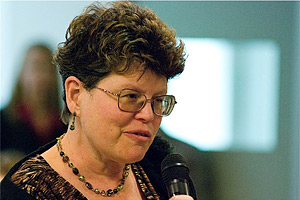
FAITH MACDONNELL, THE INSTITUTE ON RELIGION AND DEMOCRACY: I want to say thank you to John for IRFA. It gives people that we work with hope because they would always say, “What can we do to help?” Since 1998, there has been a lot more they can do to help.
Funny, I was going to talk about the universality of human rights as well because even before IRFA – I think it was around ’93 or ’94 at the U.N., our friend Nina Shea was there when there was a great debate going on about the universality of human rights, and I see this as a way of countries that don’t want to promote religious freedom and human rights being able to curb it and criticize the United States. In terms of what we were talking about – the misconceptions of the United States and of IRFA – wouldn’t you see this as part of that misconception, to say the universality of human rights or religious freedom doesn’t exist; that we’re trying to promote a different set of values than what they have and that there is not a universal set of values? How do you deal with people who say that?
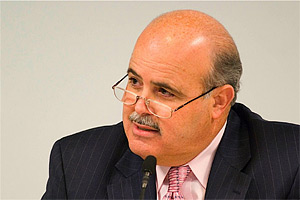
LUGO: Can we have Ambassador Shattuck weigh in on that, given the title of his book on human rights wars?
SHATTUCK: One has to stand one’s ground on what I call – I do have my own hierarchy of rights. The most fundamental right is the right not to be killed arbitrarily or tortured or otherwise have your integrity invaded. No matter where you are, under what political system you exist, physical integrity is a universal human right. There is also a universal human right to thought, belief and speech, which I do not see as in any way subject to the arguments of relatively that were sometimes made by the Soviet Union. We were talking about that case earlier.
I would put religion very much in the top hierarchy I’ve just described. Then you get into variations on different kinds of rights, whether they’re social or economic rights, rights that are indeed culturally bound. One of the great debates that’s underway now – and I think it’s swinging toward universality – is whether basic rights against discrimination on the part of women, minorities, and people for reasons of sexual orientation, whether those are universal. That is swinging very much toward universality, although there is a great deal of resistance around the world, particularly in Islamic countries, to that.
FARR: I would certainly argue that religion and religious freedom is a universal right. Article 18 of the Universal Declaration is recognized implicitly as such in the Universal Declaration because it’s one of the so-called nonderogable rights, and David Little has written about this.
But I would approach it also from a commonsense point of view. Human beings are religious by nature, if you define religion as the search for transcendence to determine whether there is something out there other than me, and if there is, do I owe it an obligation? Should I be in communion with it? I think most people – virtually all people – ask and try to answer this question universally, wherever they are and whatever their income level or class or so forth is.
Protecting this right is protecting something that really does go to what John Shattuck called the fundamental dignity. If this right is taken away, you’re being assaulted at the core of who you are. But I would add to much of what has been said here that I believe religious freedom is much more than the right to be free of persecution and even the right to worship and to, as John so eloquently puts it, seek God as your heart tells you to do. I believe it also encompasses the right to live publicly. At the end of your religious search, for many people, there are obligations that ensue, public obligations. The challenge is to develop these obligations in society and to understand how to live in a society with other people who have a religious sense of obligation.
Religious freedom is not simply, in my view, protecting people’s right to do what all religious people do in their houses of worship. It is the right to go public. This hits James Standish’s [issue of ] proselytization. There are obviously limits to that. As Alan Cooperman said, there are limits to every freedom, including religious freedom, but it also includes the right to engage in political debates on the basis of religiously informed moral judgments. This is tough, but I think this goes to the major issues of our day and the problems we’re encountering, particularly in the greater Middle East. I apologize for using that as a launching pad.
SHATTUCK: Can I just make one comment, very brief, and that is I completely agree there needs to be a right to bring to the public square, as you put it, one’s moral judgment based on one’s religious belief. That’s absolutely fundamental. But it’s confused often in our society, and particularly recently, with the question of whether the government can sponsor a religious activity, which is not bringing your own moral belief into the public square, but instead bringing the activity of that particular religion into the public square. That’s where both our Constitution and more generally our – well, I’ll stick with the Constitution – draws the line.
FARR: If I could just respond briefly, I think this is part of the problem we have, agreeing where that line is. If I hear strict separationist tones coming from you, John, forgive me, but I think I discerned them. I go back to Al Stepan’s Rawlsian normative roadmap argument, in which he was saying transitions to democracy are not generally strict separationist affairs. They occur when religious communities see this line in a very capacious way, and they work with it.
If you’re saying religious organizations cannot bring to bear their understandings of what the laws ought to be, then I think you’re drawing the line a little bit too – I’m not accusing you of that, but I think you’re drawing the line a little bit too narrowly. This is the problem we ought to be grappling with in our foreign policy, not just in the red state/blue state issues we have – I don’t want to make it a culture war issue. It isn’t. It’s an issue of American national security.
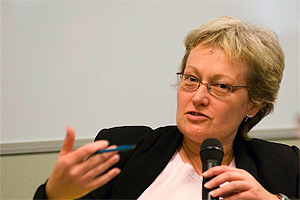
PATRICIA ZAPOR, CATHOLIC NEWS SERVICE: Another organization that was created by this law, of course, is the Commission on International Religious Freedom, which nobody has managed to talk about yet.
FARR: I did. I mentioned them in a parentheses.
ZAPOR: That’s what I’m opening the door to. You’ve talked a fair amount about the relationships among the office and the State Department and diplomacy in general. I’d be curious to know what you think of the role the commission has played. I know they have been very critical of the State Department office at times. Has everything worked the way it should be working? Is the relationship generally functioning the way it ought to, to make the universally recognized goals of the law happen?
HANFORD: We also have here a former commissioner, David Saperstein, who came a little late. That’s a tough question for me. I’m a non-voting member on the commission, and recently I actually had them withdraw my name and picture and other things from it because the recommendations were going so differently from what I agreed with. I know people, people I respect a great deal, who feel the creation of the commission was a mistake. I don’t feel that way. Even though I disagree with their collective wisdom at times, I think the overall elevation of the issue and getting the discussion out there has been positive.
When we created it – a little inside baseball here – it was the last thing we created. Laura and Will and I, sitting around the conference room in Senator Lugar’s office, sat there and debated: Do we want to put this unpredictable thing into the act? Who knows who is going to be appointed and how they’re going to behave? Commissions take on a life of their own, but we held our breath and put it in the act, and –
CROMARTIE: Good for you. (Laughter.)
LUGO: No amen corner here, Mike. Come on. (Laughter.)
HANFORD: The commission is supposed to be issuing policy recommendations. We envisioned people being selected that perhaps were a little more professionally suited to that in particular than has been the case. Some are; some don’t have much background in this field.
The commission has fashioned itself as a watchdog and critic and righteous voice on the issue in a way we didn’t entirely envision. When they’re right, that’s easier to accept. When we have qualms about it, and when there is a confusion in the way they portray themselves so that foreign governments come away feeling they are representing the U.S. government – sometimes they call themselves an agency of the U.S. government, and that’s not what they are. The staff is paid but they are not a U.S. government agency.
That actually can undermine the effectiveness of the work of those who do represent the U.S. government. My bottom line is I think they do good. I’m thankful for them. I spend way much more of my time arguing with them than I would like, but out of that comes some good things.
SHATTUCK: Just a quick observation about the good old days prior to the enactment of the International Religious Freedom Act: I was the chairman of the first Commission on Religious Freedom Abroad, appointed by Secretary of State Madeleine Albright at that point.
FARR: No, no, advisory committee.
SHATTUCK: Advisory committee. You’re right; it was called an advisory committee. Therefore it didn’t have the breadth and power of the commission. But the point I want to make is in the early days of this effort to find a role – all three of us are agreeing it ought to be a larger role.
We see the role of religion in American foreign policy somewhat differently. It’s not surprising there are going to be many centers of activity around that, many of them coming out of the Congress. But, maybe like the dictatorship of the proletariat, the commission and other elements need to ultimately wilt away if the approach I’m urging is to be undertaken, which is a much higher-level engagement in our foreign policy with experts on world religion embedded in each State Department bureau and a significant analysis given in all foreign policy decision-making to the role religion is playing in particular countries, and, in this case, perhaps, keeping the focus in the office John so ably heads on cases of religious persecution in a human rights context, either within the Human Rights Bureau or more free-standing.
But the only way this is all going to work is if the commission moves aside and the work of the State Department gets broadened in this whole field.
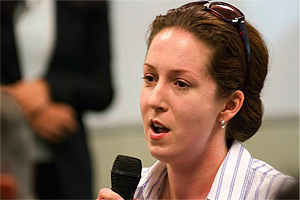
AMY SULLIVAN, THE WASHINGTON MONTHLY: I am working on a book right now about Democrats and religion, and I’m hoping Ambassador Shattuck can help figure out the answer to a question I’ve had trouble with, which is the story around the enactment of the original act and what was going on on the Clinton administration side. The tale we usually hear is they didn’t come out publicly for it until the day before, and the story is usually that the president signed it, but it was with some ambivalence, which seems unusual, given how involved the administration was in other religious freedom issues – whether it was public schools or RIFRA. I’m wondering whether the story is more complicated than that, and if so, what the concerns were.
SHATTUCK: There was a very intense negotiation – some of which I was involved in, but then I became ambassador of the Czech Republic. Stuart Eizenstat was most directly involved. It was a negotiation over the shape of the legislation, and particularly working with Senator Lieberman, who, as we’ve all noted, was one of the sponsors in the Senate bill.
One of the most difficult sticking points coming out of the Wolf-Specter bill was the mandatory sanctions provision of the legislation as it was enacted by the House. The Clinton administration was very much heading toward the endorsement of the legislation, but it was not possible to get that provision to become more permissive and discretionary, so that the range of other diplomatic opportunities were presented.
We were concerned about some of the very things I’ve described in my remarks here today, most of which have been addressed in the legislation. I was concerned that the issue was being too narrowly focused. I had been the chair of the Advisory Committee on Religious Freedom Abroad, and many of the committee’s members were urging [to focus on] the issue of religion and religious activities in other countries and the way in which we understand religion, all of which all had to be much more systematically addressed in our foreign policy. A narrow focus only on the issues of religious persecution would not be a satisfactory result.
In the end the legislation became much broader. The Senate bill was one that we could all endorse. I don’t think the administration was ultimately going to oppose any legislation, but in the process of negotiating changes, it withheld its endorsement until that rather late date. As I say, Stuart Eizenstat was the person involved most directly after I became ambassador.
FARR: If I am correct, at one point there was a veto threat. I think it was about the Wolf-Specter bill, and it came from the State Department, saying they would recommend the president veto this thing. But they did pull away from that as IRFA came in.
I would also say you can read John Shattuck’s testimony before the House and the Senate. It’s really quite good at articulating what you’ve said.
SHATTUCK: Thank you. I also want to pay tribute to Senator Lugar, and particularly Ambassador Hanford here, who was really instrumental in those days when we were trying to broaden the perspective of what the legislation should accomplish, and your remarks here today have indicated that.
I was particularly impressed by what you said about dealing with countries where you’re trying to make progress, rather than always trying to get the absolutely perfect result. You have to face the fact that in many different situations, religion is going to be subject to some degree of registration requirements. The U.S. separation of church and state wouldn’t accept that, but you’ve had to accept that. And I think that’s advanced the cause. That was reflected in your earlier work on the IRFA legislation.
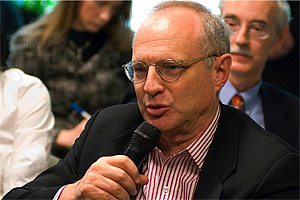
DAVID SAPERSTEIN, RELIGIOUS ACTION CENTER OF REFORMED JUDAISM First of all, these were wonderful presentations, and I want to, again, John, commend the good work you continue to do.
I want to push you on what seems to be a central thesis, in common with John Shattuck and Tom Farr, but John, you also indicated you shared the goal; that is, the goal of integrating concern about religion and religious freedom far more thoroughly into the foreign policy of the United States generally, and into the way that the State Department actually functions. Doug has been arguing for that for years and years. As you indicated, the advisory committee made a similar recommendation. Madeleine Albright’s book, The Mighty and the Almighty, makes that argument.
I would love to hear from all three of you. John Hanford has argued, okay, but not at the expense of the good things that are happening here. Let’s take that as a given. I’d like to hear, how do we do it? In other words, is there new legislation that could conceivably do that? What would it look like? If not, how hard is it to change the culture of the way we go about our foreign policy work?
Drawing on your advanced experience in the realm, what would the three of you specifically recommend as the way to create a campaign to achieve the goals that you’ve called for?
HANFORD: Some good suggestions have been made by John and Tom – for example, the need for training. This is something my office has some mandate under the IRFA Act to work toward, and we have been working with the Foreign Service Institute towards this end. We go in and train Foreign Service officers, but we’re continuing to push that this would be done more broadly.
There is a funny thing about the Foreign Service. We train our Foreign Service officers to be professional amateurs, which means they are trained to be professional diplomats, but not necessarily to be professional at anything else in the full sense of the word, because every two or three years they are reassigned to a different country, a different language, a different region, a different issue.
We should be training all Foreign Service officers, therefore, more deeply in religion, and increasingly this is happening. But I also would argue in defense that people at the department, certainly the secretary of state, given her own personal sophistication on this issue, have a very deep and abiding understanding of the role of religion in geopolitical issues these days. You can see new emphases on the public diplomacy front, and in our work in various regions. We have special training for people going to certain regions, such as the Middle East, to understand the role of religion, to make sure that people understand the distinctions and all.
Our embassies facilitate interfaith dialogue and work on tolerance in a number of countries around the world. Could we do a better job, and should we? Yes, I would agree with my colleagues up here that we should.
LUGO: But can I press you on the practicality? Are you saying, “All it would take is for the secretary of state to implement a module within the Foreign Service Institute so that all of our diplomats get it” – we don’t need legislation for that, do we?
HANFORD: No, we don’t for that. There have been other creative ideas from Doug Johnston and from Tom and others about people perhaps getting even more in-depth training. There is a place for considering that as well.
Our office does get involved in tangential issues. I mentioned our work on intolerant textbooks and materials, which really are a seedbed of terrorism around the world. We feel that’s close enough to our issue that we can become involved in it, and we’re spending a lot of time on that issue and joining with others at the State Department.
But I’d be the last person to say we are at where we should be and that there is not a lot of room for improvement.
LUGO: I’d like to hear from the other two on that.
SHATTUCK: I would favor legislation myself. I think it’s time IRFA be looked at again. I wouldn’t necessarily change any of the fundamental structures in the International Religious Freedom Act, but I would use it much the way the early mandating legislation was used regarding the Human Rights Bureau, which has grown in size and scope, I would argue – and I think most people would agree – on and off, as part of the mainstream of American foreign policy.
The way that’s happened is through legislative mandates. I would develop a mandate for a more comprehensive approach toward issues of religion. I can’t write the bill in front of you here, but we have heard [today] some of the elements we’re talking about, whether it’s training, the development of offices within each of the geographic bureaus, a requirement that expertise in religion in the areas you’re going to be serving be developed – the kinds of things, frankly, a bureaucracy doesn’t do easily by itself without being prodded.
The other aspect of the legislation I would work on is, I would focus more of our foreign aid on institution building relating to anti-discrimination institutions in particular countries and ways in which that should be part of our whole democracy-promotion activity. At the moment it’s an afterthought by those who are implementing the democracy-promotion work through AID, et cetera, but it’s not mandated, and I would mandate it.
FARR: I would agree that legislation would be helpful, while keeping in mind the State Department has 200 years of expertise in strangling the baby sent over by Congress without actually killing it. (Laughter.)
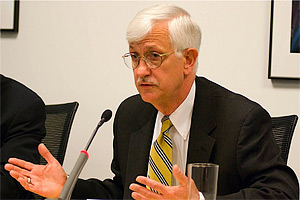
FARR: It is something I believe needs to have a policy basis. In other words, there has got to be a real compelling reason. I, for the life of me, don’t understand why it isn’t already seen that way because if we look around us, it’s not hard to see how religion affects the world in which our American diplomats are paid to engage, and therefore I think a policy argument can be made to this. A decision by a president and secretary of state could do wonders.
Doug Johnston has suggested for years a religion attaché. As I’ve told Doug, it sounds a little scary to put it that way, and I like the idea of a religion sub-specialty. I was a political officer in the Foreign Service. I had sub-specialties in arms control and political military affairs. You could have a sub-specialty in the sociology of religion. It’s very important, as I said, that we get away from this idea that we need to find the Methodist or the this or the that, because they have a personal interest in it. There is nothing wrong with that, and often that’s going to be the case, that people are interested in this out of their own religious convictions, but we have to see it as a policy problem for our country, a national interest problem.
We need cross-fertilization, which John Shattuck mentioned, into the regional bureaus. They are the powerhouses of State, the Near Eastern Affairs [Bureau,] the East Asian bureau, all of them. They are the ones that control the assignments. They’re the ones that control, for the most part, the promotions. Promotions and awards, that’s another way to do this.
In the bureau John worked in – John Shattuck worked in and John Hanford now works in, the Bureau of Democracy, Human Rights and Labor – you will find some of the most dedicated, talented people you’ll ever find in the American Foreign Service establishment. But I would disagree with John that it has been mainstreamed. I don’t think it has at all. I think it’s out of the mainstream of American diplomacy – always has been. There are lots of reasons for this. We’re not going to solve them here, but I think they have to be addressed because religious freedom is right in the middle of that problem.
My final point is [the need to study] the sociology of religion and politics of religion, not this tradition or that tradition. However, if you’re going to Cairo, then you ought to have area studies that really get you into Sunni Islam, and [Sheikh Seyyid] Tantawi, and the al-Azhar, and the Coptic minority. But we need to have people who think, in a policy sense, about this, and not just in terms of particular religious traditions.
LUGO: Thank you. Thank you so much for attending, and please help me to thank Ambassadors Hanford, Shattuck, and Tom Farr. (Applause.)


